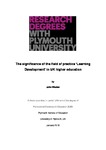The significance of the field of practice ‘Learning Development’ in UK higher education
| dc.contributor.supervisor | Pratt, Nick | |
| dc.contributor.author | Hilsdon, John | |
| dc.contributor.other | Plymouth Institute of Education | en_US |
| dc.date.accessioned | 2018-01-17T16:12:44Z | |
| dc.date.available | 2018-01-17T16:12:44Z | |
| dc.date.issued | 2018 | |
| dc.identifier | 10029559 | en_US |
| dc.identifier.uri | http://hdl.handle.net/10026.1/10604 | |
| dc.description.abstract |
This thesis analyses Learning Development (LD), a field of practice designed to support students’ learning, and explores what this relatively new field can tell us about certain aspects of higher education in the UK. Theoretical work deriving from Foucault underpins the research. The empirical data is constructed from interviews, observation and reflexive autoethnographic sources, and the analytical thrust employs sociolinguistic tools from critical discourse analysis. The result is a case study of identity, offering unique insights into the field of LD itself and, through the ‘lens’ of LD, an original focus upon the production of relationships and their effects, as policies are enacted, within HE in the UK in the early 21st century. Although previous studies have examined the identities and practices of different university workers in terms of concepts such as ‘tribes’ and ‘territories’, and the impact of neoliberalism, this thesis takes a more relational approach. By combining a problematising theoretical framework with discourse analysis, it sheds light upon the mutual construction of relations between LDs, academics, students and university managers, as HE policy is produced, interpreted and enacted through practice at institutional levels. These insights also contribute to an understanding of the operation of ‘governmentality’ within universities. The LD lens brings into focus: i) the continuing drive towards commodification of all aspects of HE, including approaches to learning, under neoliberal economic and political conditions ii) the lack of preparation on the part of UK universities for some aspects of ‘diversity’ and the failure to fulfil the broad mission to widen participation commonly expressed by successive government policies since the 1990s iii) the persistence of traditional approaches to HE practices (particularly the privileging of ‘essayist’ literacy) iv) the tendency to limit student subject positions in respect of how HE is conceived and delivered The thesis concludes by offering some suggestions for further research and practice that may be useful for Learning Developers (LDs), academics and policy-makers in addressing these issues. | en_US |
| dc.language.iso | en | |
| dc.publisher | University of Plymouth | |
| dc.rights | Attribution-NonCommercial-ShareAlike 3.0 United States | * |
| dc.rights.uri | http://creativecommons.org/licenses/by-nc-sa/3.0/us/ | * |
| dc.subject | Learning development | en_US |
| dc.subject | Study skills in higher education | |
| dc.subject | Critical discourse analysis | |
| dc.subject.classification | Other (e.g., MD, EdD, DBA, DClinPsy) | en_US |
| dc.title | The significance of the field of practice ‘Learning Development’ in UK higher education | en_US |
| dc.type | Thesis | |
| plymouth.version | publishable | en_US |
| dc.identifier.doi | http://dx.doi.org/10.24382/1159 | |
| dc.identifier.doi | http://dx.doi.org/10.24382/1159 | |
| dc.rights.embargoperiod | No embargo | en_US |
| dc.type.qualification | Doctorate | en_US |
| rioxxterms.version | NA | |
| plymouth.orcid.id | 0000-0003-1670-710X | en_US |
Files in this item
This item appears in the following Collection(s)
-
01 Research Theses Main Collection
Research Theses Main



